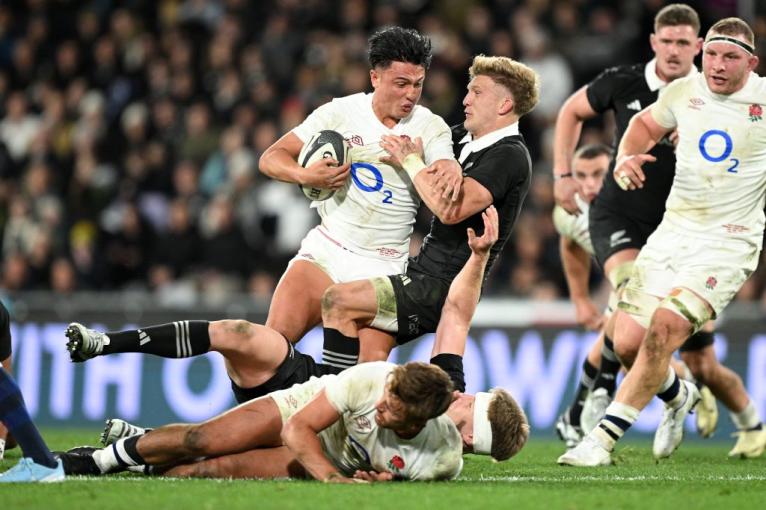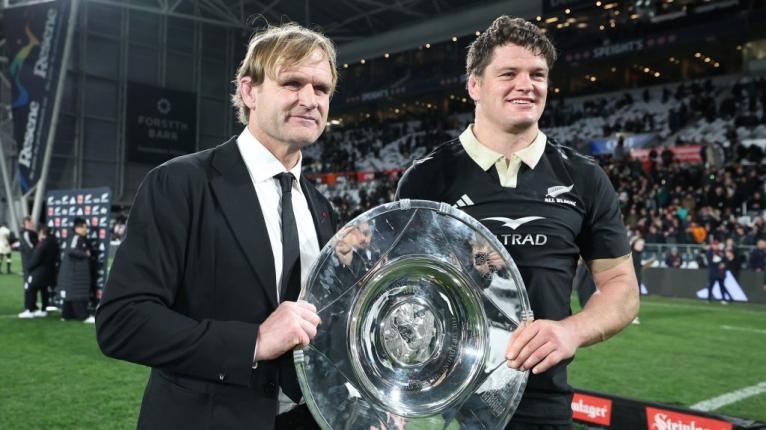Rugby like life is full of ‘what ifs’. For Steve Borthwick’s England, the story of opportunities not taken will be close at hand after the first Test against the All Blacks in Dunedin. He only needs to pick up the book and read it.
What if referee Nika Amashukeli had noticed New Zealand loose-head Ethan de Groot popping his head out of the left side of the scrum illegally before the ploy had already earned the All Blacks two penalties in the first half? What if Marcus Smith had enjoyed a better day off the tee, where he converted only one of four kicks at goal?

Coulda, woulda, shoulda. Ultimately, Scott Robertson will be seeing the match in exactly the same terms. These are his words from the first post-match press conference as national coach:
“In the first half we had a lot of [attacking] opportunities we didn’t take, we played some great footy… they [England] hung on and were desperate. Second half, we got into an arm-wrestle, [one] which we could [never] quite get out of.”
At times England may have been hanging on in that first period, but they very rarely looked desperate. As the match wore on, Red Rose confidence in the ability of their defence to withstand and disrupt the All Blacks attack only grew and grew.
With you @tj_perenara 🖤
TJ is under going scans in Auckland and we’ll provide an update when we know more information pic.twitter.com/vi4Tj8jZab
— All Blacks (@AllBlacks) July 7, 2024
The question of whether a New Zealand offence nurtured on Super Rugby success can break down the best of blitz from across the globe is still alive and well. It has been thus ever since 2017, when the British and Irish Lions defence coach Andy Farrell [now head honcho with Ireland] first brought the true meaning of line speed to the shaky isles.
On that tour Farrell Senior’s charges conceded only five tries in a drawn three-Test series, and 18 tries in 10 tour games overall. It was not the try-scoring return New Zealand supporters had come to expect. Since then, South Africa have packed their bags and headed north, and Rassie Erasmus’ Springboks have risen to the top of the international game on the back of a rabid blitzing defence which has provided the platform for two consecutive World Cup triumphs.
Felix Jones, the Kilkenny-born coaching consultant for those two victories in 2019 and 2023, is now the English defence coach, and he has brought a fully-fledged version of the Springbok blitz with him to dear old Blighty. The questions surrounding New Zealand’s capacity to deal with the kind of aggressive defensive structures they do not experience in Super Rugby will only intensify. ‘Razor’ again:
“It definitely wasn’t Super Rugby, was it?… You don’t feel their line speed, there are only a couple of teams in the world – South Africa are the only other one – with that genuine speed on the second and third pass. They’ll go and get ya with that ball in the air [on the pass].”

When the ex-Crusaders man sits down with his assistant coaches for a full analytical debrief, he will probably not enjoy reading the offensive stats the All Blacks backroom staff drop in front of him.
Despite building 46 extra rucks and setting sail on 52 more carries than the men in white, New Zealand had fewer metres to show for their efforts – 334m to England’s 349m. Fly-half Damian McKenzie had only three defenders beaten, and no clean breaks or busts in the 52 bits of possession he received. But perhaps the most un-All Black statistic of all was the sheer volume of kicking: 34 kicks for 1004m, a figure near-identical to Borthwick’s championship-winning club Leicester Tigers in 2021-22 – well before the Cumbrian’s Damascene moment.
New Zealand kicked the ball 12 times in open play in the final 20 minutes alone, a period when they are typically used to confirming their superiority on their own patch, and running away from their opponents, both literally and figuratively. The eyes of Ex-England and Lions centre Will Greenwood lit up at the analytical banquet served in the Sky Sports studio after the match: “England are only going to double down on this defensive system”.
Nick Evans has a foot in both camps. In his playing career he was an outstanding long-time back-up to the legendary Dan Carter, but all his seven years in coaching have been spent as an attacking assistant in England with Harlequins, and for a brief spell with the national side. His offensive brain was already working overtime, chewing the fat and looking for loopholes at the post-match smorgasbord.
“If you are New Zealand, you’re thinking – how are we going to exploit this [defensive] line speed next week [at Eden Park]?
“[In the] second half they got a little bit guilty of going side-to side-too early, and they fell into a trap.
“Sometimes it looks like there is some space out there, but it is fool’s gold. The cover defence can scramble and the full-back closes [down from the backfield].
“They got a lot of pay from those ‘punch’ plays narrowing the defence in and around the ruck in the first half – [left wing] Mark Telea coming in on the pick-and-go, [scrum-half] TJ Perenara playing little [passes] around the ruck, which can accentuate any narrowness on the edge.
“It will be interesting to see if they are more direct at Eden Park.”
What does Evans mean by sieving for the fool’s gold on the edge of the field? Here are a couple of examples, one early, one late on in the game.

In the first clip, the last two England defenders [number 13 Henry Slade, and right wing Immanuel Feyi-Waboso] are both embarking on a steep blitz from the sideline into midfield. But the 20m of depth between McKenzie and the second ball-player [Rieko Ioane] mean by the time the ball has reached Telea on the left edge, he is confronted by three scramble defenders and promptly robbed in contact by Maro Itoje. Fool’s gold is losing the battle to gain time and territory in the movement of the ball from one sideline to the other.
In the second instance, the All Blacks make no fewer than seven passes from midfield out towards the left touchline, only to drop the ball into the hands of a prop [Ofa Tu’ungafasi] with no net gain in metres.
On other occasions, the depth of the New Zealand attack provided no added protection from an onrushing England midfield and it did not dimmish the risk of an interception. The further the All Blacks retreated, the harder the Englishmen chased them down.


There are another 20m of depth between McKenzie and his second receiver Jordie Barrett in the first example, but it does not deter Slade from driving straight on to the Hurricanes centre and very nearly creating an interception try for the Exeter man outside him. Close, but no cigar.
In the second of the two clips, the All Blacks have just won a turnover deep in their own end, and inside centre Ollie Lawrence makes a beeline straight for the Chiefs’ mercurial playmaker, jagging from out to in. The outside of the field will take care of itself if he can create enough mayhem in the middle. Once again, it is uncertain which team is running the greater risk on the runback in this scenario.
By the finish, England were even able to deny the crosskick, the quickest means of getting the ball to an edge, and a ploy which the All Blacks had utilised to score an excellent opening try of the game.
Both teams will have some concerns about the performance of their 10 after the first Test. Smith and McKenzie managed a miserable 40% goal-kicking success rate between them; the Chiefs man came no closer to solving the conundrum of a committed rush defence than Beauden Barrett had in the 2017 Lions series, while the Harlequins’ pivot still does not look totally comfortable in his own skin roaming the often-claustrophobic corridors of the international game.
He missed a golden opportunity in the first half after a long break down the England right.
In the second period Smith used a beautiful double-pump to lever open a corridor for Chandler Cunningham-South in the build-up to England’s second try; if he had probed the gap himself, or made the same pass to Slade on this occasion it is hard to see how England would not have walked in to score. Woulda, coulda, shoulda.
There are more questions than answers on both sides of the fence. Do Smith and McKenzie have what it takes to run the national cutter? Can the All Blacks break the spell of blitz defence when they don’t see it in their domestic competition? Can Borthwick’s charges break the hoodoo and win a Test at Eden Park? The what ifs proliferate, and the fate of this series is far from written.


All Blacks 43 England 9
How did your prediction go B.J? Oh yes, wrong in both games!
It reminded me of the disastrous NH tour of 2021 where we tried to beat rush defences by going around them, standing progressively deeper and deeper only to end further and further in a hole. It has been proven over and over again to be the absolute worst way to counter defensive line speed. To see the exact same plays used on the weekend as on that tour, with 10 in the boot passing to an even deeper second play maker taking the ball at least 30m behind the gain line with no good options available to him was shocking. The play book has been ripped up apparently , but it looks like they found one of Brad Mooar’s old copies lying around and inexplicably tried to use it.
It’s hard to believe that after all these years of watching ABs teams fail at executing this plan that it was Plan A from Razor and co. Ignorance? Hubris? By the World Cup last year we had developed a very good template - as Nick Evans says punching holes, combined with regular kicking on first phase before the ball becomes static, with an organised chase.
Razor spoke about what to throw out and what to keep and evolve, I know it was their first game but it looks like they kept the wrong things. Hopefully they correct course quickly.
I’ll share with you my findings that I made for Flatcoat, but first, what did you make of Barrett(Beauden that is)? I thought he was well off from being ready, and if it wasn’t such a tiny squad he might have waited to see Fiji. Then again, thats it before he has to be upto speed in the RC right?
I just finished a rewatch of the first half to note this and a few other things.
Heres my blitz notes, basically any plays where Englands trys to blitz an attempt by NZ to attack/move the ball, you can view this as basically whenever the 2nd receiver is not hitting it up, when hes looking to do something.
0:22 manny has to turn and chase Ioane
6:55 pass slapped down
14:01 dmac wide lob to unmarked Talea
14:26 dmac across the face of biltz to unmarked Reece
14:40 long pass bounces which Talea uses to wrong foot blitz
*14:55 Ioane tackled winding up a long/cutout pass
24:02 defender goosed and others have to turn and chase
26:59 def leaves wing but dmac gets pass away to unmarked Talea
29:30 blitzh not beaten us such, dmac pass in face again finds hole runner (beaten but not by going wide)
29:45 lob pass over blitz into space
33:30 dmac face pass find hole again
35:28 counter attack, beaten one on one
3x:56 ca, dmac face pass
At this point a graphic comes on screen show England have made 26 tackls, NZ 73
40:59 Taylor finds himself outside of winger (who has come forward into nomans land)
facepass is where ball passes right in front of the defenders face (trying to blitz/rush it down in this instance obviously), essentially a skip pass in most instances
Those are all the times the English blitz challenged NZs attempts to not carry, you will note that only once was it successful, and this* was when the tackler got himself in a position to give away a try anyway. So if we exclude that, the All Blacks were 100%, 13 from 13, at beating the blitz in the first half.
I’m really not sure what the second half would show, but I liked the forwards shape better in the second, so I’m guessing there wasn’t a whole lot of blitz going on. I’m suspecting this is what Razor wasn’t happy with, not captilizing or putting pressure on that blitz with the better carrying work the subs etc were doing. Like in Mt Smart, I loved the kicking strat/quality instead. But yeah, not so many of those deep plays you talked about, much more in the face/under pressure stuff that did look rushed (only a few perfect passes in there).
The best chance for England to beat NZ was last week and frankly they came close. Playing at Eden Park is not an easy thing and ENG needs to play like the boks to have a chance. Use your big forwards, play ball posession and field position in offense and use that rush defense and cross your fingers…
So many times I’ve seen the ABs blow out teams in the last 20 minutes…
I hope they don’t though John, prefer to see this attack they’ve been talking about go hammer and tongs against the All Blacks.
Could, woulda, shoulda what a ridiculous article rambling about what ifs. Given the respect for england being formidable opponents the time to take advantage is during the 80 minutes available to perform whatever strategy they train for. Inherently the abs are the toughest team to come up against and although they are somewhat rebuilding they got out on top. A rusty start but they’ll be better prepared.
He’s just playing on the fans that have been going on and on after all these awesome Finals weve had the last 6/8 months monty.
You do understand the word ‘analysis’ don’t you?😅
The one thing that was a positive was the lack of fumbles that so often marked the ab game. Very little dropped ball if any for a first match. But that silly side to side has to go and they really need some decent midfield revamp. When do ioane last do anything at this level. He won’t make 2027. Get on with the next gen.
I think that midfield will come under scrutiny as Razor sorts the wheat from the chaff Paul.
I think the best part of that match was the plethora of staff on the ab side and 2 for England. It’s a joke how many coaches they need now.
By “best” you mean the AB won the coaches box standoff as well right. That All Black bench looked mean with Razor being the haka orchestrator walking around and inbetween everyone.